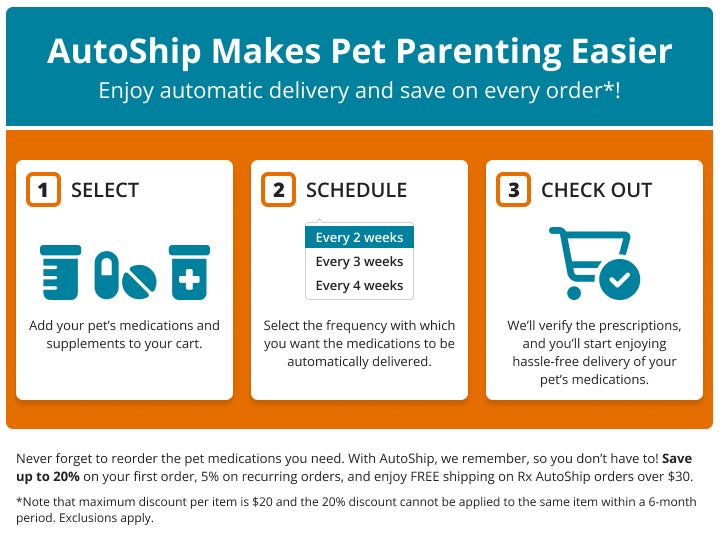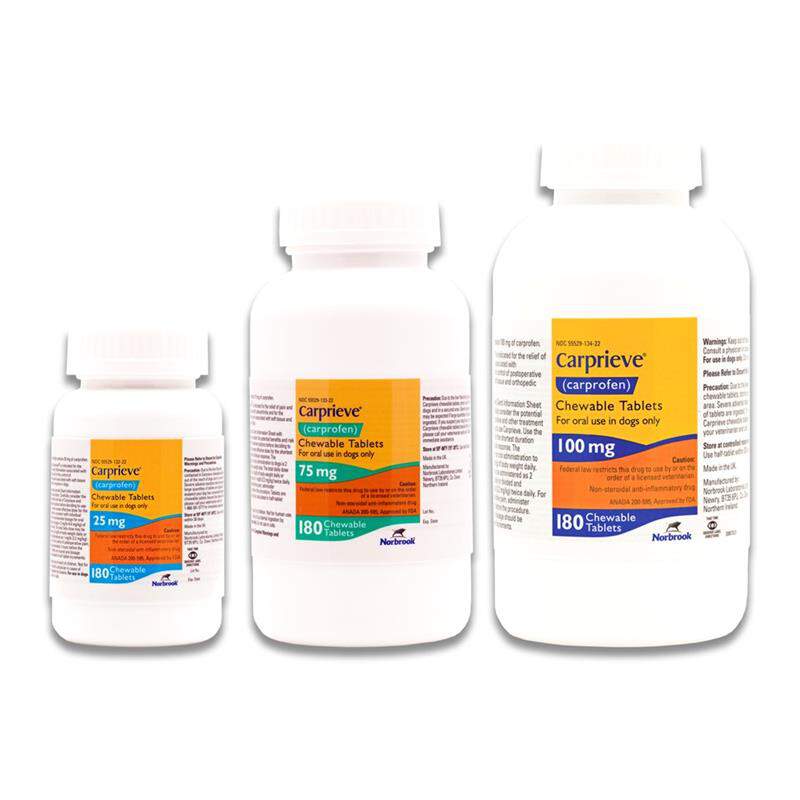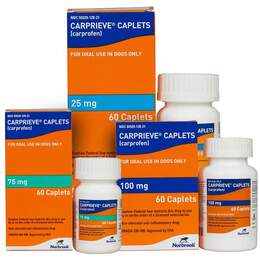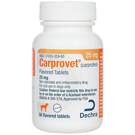

1 of 1
Click on image to open expanded view
Item No.
51037
AutoShip & Save 20%
- Save on your Autoship
- Hassle-free: Easily Skip or Change Shipment Dates.
- Commitment-free: Cancel anytime
- Free Shipping.
With AutoShip, we remember so you don’t have to! Learn more
Carprieve (Carprofen) Chewable Tablets Description
Carprieve (also known as Carprofen) Chewable Tablets can be used for:
- Fever reduction
- Inflammation and pain relief from osteoarthritis
- Orthopedic and soft tissue surgery postoperative pain control
Available in the following chewable tablet counts:
- 60 count
- 180 count
- 25 mg
- 75 mg
- 100 mg
What is Carprieve (Carprofen) Chewable Tablets?
Carprieve (Carprofen) Chewable Tablets are used to treat pain and inflammation from conditions such as arthritis and other joint diseases including hip dysplasia as well as the reduction of fever.
Which animals/pets is Carprieve (Carprofen) Chewable Tablets for?
Carprieve is only intended for use in dogs over the age of 6 weeks.
Carprieve (Carprofen) Chewable Tablets uses
Carprieve is:
- Able to be used in the long term
- Used to relieve arthritis or joint pain in dogs
- A caplet that is easy to administer
What does Carprieve (Carprofen) Chewable Tablets do?
Carprieve is an NSAID. That means it’s believed to work by inhibiting the activity of cyclooxygenase.
Carprieve (Carprofen) Chewable Tablets side effects
The vast majority of patients with drug related adverse reactions have recovered when the signs are recognized, the drug is withdrawn, and veterinary care, if appropriate, is initiated. Owners should be advised of the importance of periodic follow up for all dogs during administration of any NSAID.
Possible adverse reactions:
If your animal shows intolerance signs, contact your veterinarian and discontinue product use.
Possible adverse reactions:
- Behavioral changes
- Seizure
- Incoordination
- Lethargy
- Yellowing of eye whites, skin or gum from jaundice
- Pale gums from anemia
- Increased urination
- Increase in water consumption
- Tarry or dark stool
- Diarrhea
- Vomiting
- Decrease in appetite
If your animal shows intolerance signs, contact your veterinarian and discontinue product use.
Carprieve (Carprofen) Chewable Tablets ingredients
Carprofen
Carprieve (Carprofen) Chewable Tablets overdose: What to do?
Contact your closest emergency pet hospital.
What to know before using Carprieve (Carprofen) Chewable Tablets
This product should be kept away from animals and children.
ONLY use this product on dogs. Never use this product on pregnant or nursing animals or cats. Do not use on dogs that have previously shown a carprofen hypersensitivity.
Precautions:
ONLY use this product on dogs. Never use this product on pregnant or nursing animals or cats. Do not use on dogs that have previously shown a carprofen hypersensitivity.
Precautions:
- Cyclooxygenase inhibitory NSAIDs, as a class, could have an association with hepatic, renal, and gastrointestinal toxicity. This may be due to inhibition of the enzyme cyclooxygenase and decreased prostaglandin production responsible for the formation of prostaglandins from arachidonic acid.
- NSAIDs provide prostaglandin inhibition that causes inflammation. It may inhibit those prostaglandins that maintain normal homeostatic function as well. For patients with pre-existing or underlying disease, these effects may be more significant.
Therapy using NSAIDs may show previously undiagnosed occult disease because there were no signs that were clinical. For example, NSAID therapy may exacerbate in a patient with underlying renal disease. To reduce the risk of complications that are renal while preoperatively using NSAIDs, consider using parenteral fluids in surgical procedures.
This drug is an NSAID. Administering carprofen and drugs in this class can lead to adverse reactions. Gastrointestinal signs are the effects most frequently reported.
Other effects reported include:- Hepatic
- Dermatologic
- Neurologic
- Hematologic
- Renal
Approach concurrently administering drugs that are potentially nephrotoxic with monitoring and caution. Avoid using carprofen concomitantly along with other drugs that are anti-inflammatory. This includes corticosteroids and other NSAIDs, as this could lead to reactions that are adverse such as perforations or ulcerations of the gastrointestinal system. These reactions and sensitivities vary from patient to patient.
If a dog has had an adverse reaction to an NSAID, the same reaction could occur in another one. In healthy dogs, safety studies that are well controlled show animals can tolerate up to ten times the dose without gastrointestinal ulceration or renal toxicity.
For dogs with bleeding disorders such as Von Willebrand’s disease, Carprieve is not recommended. Safety for dogs with these disorders has not been established.
Safety has also not been established for:- Lactating bitches
- Breeding dogs
- Pregnant dogs
- Animals 6 weeks of age or less
Carprofen treatment may reduce the inhalant anesthetics level required. Consider alternative analgesia should more pain medication be needed following a daily total dose of Carprieve. It is not recommended to use another NSAID. When you switch to NSAID use from using corticosteroids or switching between NSAIDs, consider the washout times when appropriate.
How is Carprieve (Carprofen) Chewable Tablets sold?
Available in strengths of 25 mg, 75 mg and 100 mg in 60 or 180 count chewable tablets
Manufacturer
Norbrook
Overview
Use as directed by your Veterinarian
Dosage and Administration:
The recommended dosage for oral administration to dogs is 2 mg/lb of body weight daily. The total daily dose may be administered as 2 mg/lb of body weight once daily or divided and administered as 1 mg/lb twice daily. For the control of postoperative pain, administer approximately 2 hours before the procedure. Carprieve chewable tablets are scored and dosage should be calculated in half-tablet increments. Tablets can be halved by placing the tablet on a hard surface and pressing down on both sides of the score. These liver flavored Carprieve chewable tablets may be offered to the dog by hand or placed on food. If the dog does not willingly consume the tablets, they may be hand-administered (pilled) as with other oral tablet medications. Care should be taken to ensure that the dog consumes the complete dose.
Main Ingredients
Carprofen








